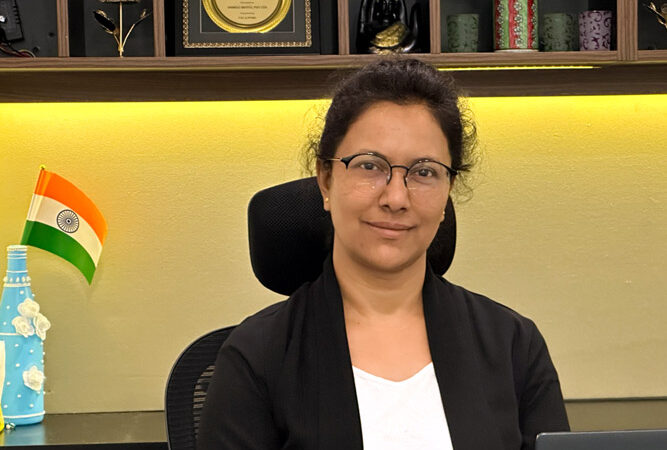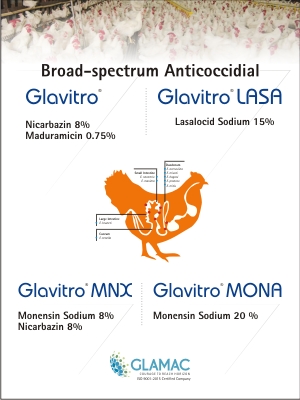In an exclusive interview to Poultry TRENDS magazine, Dr Leena Bora shares her career journey and experiences as a women working in an industry that deals with veterinary pharmaceuticals.
Vamso Biotec’s Commercial Director, Dr Leena Bora, says that in order to succeed, every women must believe in herself and be brave enough to speak up.
Here’s more about her inspiring journey and her advices to other women in the Animal Health Sector.
Brief Introduction: Dr Leena Bora, a native of Assam, graduated from the College of Veterinary Science in Guwahati with an undergraduate degree in veterinary science and a master’s degree in veterinary medicine. When she joined Cattle Remedies India Limited as a Product Executive in November 1999, it was the beginning of an exciting journey for her. Over the years, she has worked for different companies and handled different responsibilities. Her persistence never wavered despite tough challenges. She spent 11 years working in Marketing & Technical in the ruminant segment before taking on the role of managing sales in poultry. Her entire career prepared her for her current role as a Commercial Director at Vamso Biotec Pvt. Ltd. She served as the Chief Operating Officer of Saife Vetmed Pvt. Ltd. before joining Vamso. Associate Director at MSD Animal Health, AVP at Hester BioSciences, Group Product Manager at Bayer Animal Health, Group Brand Manager at Ranbaxy Animal Health were some of her previous assignments.
How would you describe yourself in a few words?
The professional me is a veterinarian who has been working in the private sector for more than two decades and explored a good part of India while pursuing a career in marketing & sales. My view of myself is one of a people person. Outside work, I enjoy reading books and being with nature.
What made you decide to become a veterinarian?
My father is a veterinarian as well, so the decision to become one came naturally to me. I have been greatly influenced by his dedication to this profession. Growing up, I often accompanied him as he handled cases. It wasn’t long before I knew what terrain was suitable for dairy or poultry farming, and that humans & animals have similar body systems which explains their similar approaches to treating ailments.
When you started your career, veterinary pharma was not a sought after career choice for lady vets. What inspired you to join the same?
It is true, I was the first lady vet from North East India to have opted for the veterinary pharma industry. Back then, government jobs or academia were the most popular career paths for women vets . In all honesty, my entry was purely by chance. I recall a particular day, while I was in my 2nd year of Ph.D., when one of my professors presented me with a visiting card of a regional sales manager of a private veterinary company and told me to talk to him. The manager I spoke with just asked, “Are you ready to enter a field where lady vets are rare”. Even before I knew what the job entailed, I immediately said yes. There began my journey with excitement about venturing into an unknown arena and willingness to face challenges as they arose. It was a great start, and I haven’t looked back since.
When you began your career, could you imagine yourself in a leadership role in this industry.
I started as a product executive and it didn’t take long for me to become interested in what I was doing. Soon, I found myself preparing for bigger responsibilities. Initially, I focused on just the next promotion. I learnt a lot from every position I took up whether it was in marketing or sales. Besides traveling across the country and abroad, I spent a lot of time in the field and interacting with different stakeholders of business. My position just sort of evolved over the years.
Please tell us about someone who has inspired you the most. Are there any other women you have drawn inspiration from?
A person who has overcome obstacles & adversities has always inspired me. I have drawn inspiration from many women. My earliest inspiration was a woman I saw ploughing fields with a yak on the slopes of Arunachal Pradesh. It was striking because I’ve always seen a man do this role that too using big humped bulls in plain land, not a women in hilly landscapes. That’s when I realized, whether you are a man or a woman, if you really want something, you can achieve it. Years later, as a marketer, I was inspired by Indira Nooyi’s strategic reorientation of Pepsico with an emphasis on health and the environment. Fortune ranked her as the number one most powerful woman in business in 2009 and 2010.
Power means something different to everyone. What does power mean to you?
I feel influence to be a better terminology than power. When it comes to power, it emanates something authoritative & dictatorial about it.
In your opinion, what is the most significant barrier to women’s leadership?
The feeling of self-doubt. I have often seen that when it comes to speaking up for themselves, women tend to hesitate to be vocal and often learn this quite lately on in their careers that they should have opened up. This hesitation deprive them of what they actually deserve.
Have you noticed assumptions or biases as a female leader?
Yes, couple of them actually. People often assume that women’s promotions are by virtue of being female. I find it very discourteous and unacceptable. The chances of a company promoting someone without merit are slim, regardless of its diversity policy. Moreover, there is the assumption that women leaders in our country will not be accepted. Once I was told in an interview of a very reputed company that “You are the most perfect fit, but we are not sure whether men in your team will accept a women leader, especially in India”. I was literally stunned and did not know what to say. Isn’t there enough historical evidence about women leadership in our country?
What do you think helped you the most to make a career as a women. What was your success mantra?
Enjoying what I am doing, staying close to my strengths and being confident to do it well has always worked for me.
If you had to pick up the best pieces of business advice you have received, what would that be?
There are two in particular that I’d like to mention. First, embrace your uniqueness, stay true to yourself and don’t let anyone define you, your life or your future. Second, you don’t have to know all the answers. Sometimes saying no is okay, that does not mean you are weak.
In your career as a female leader, what leadership lessons have you learned?
As an example, let me tell you about an incident from a few years ago. One evening, my colleagues planned to have dinner with some visitors after having a full day meeting with them, but I wasn’t invited since I was the only woman in that group. Although that experience was unpleasant, I learned about inclusion from it. Regardless of gender, there was a valuable lesson here for all leaders.
What do you do when you need to unplug from your work? What energises you the most?
I make a long list of things to do for the weekends or holidays. Visit friends and family, do yoga or go for a walk. My most favourite pastime is seeing the world through my camera lens, and I love spending time with it. After a busy week or a busy month, a photography tour totally rejuvenates me.
Which other industry would you have chosen if you had the choice.
The mobile industry. This industry has undergone amazing changes over the past few years. It is no longer about calls and messages, for which the mobiles were originally designed. Nowadays, it’s all about cameras, GPS, high-speed data modems, scanners, app stores and so much more.
The theme for International Women’s Day 2023 is “DigitALL: Innovation and technology for gender equality”. What would you say in this regard.
In a survey conducted by NFHS, the percentage of women and men who have ever used the Internet in India was determined. According to the report, only 42.6% of women have ever used the Internet, compared with 62.16 % of men across the country. The average rises to 56.81 % for women and 73.76 % for men in urban India. The figures for rural India are much worse: only 33.94% of women, compared to 55.6 % of men, have ever used the Internet. However, our country is not the only place where this disparity exists.
Increasing digitisation of workflows is one of the major changes that occurred post-Covid. It is therefore imperative to adopt digital technologies. Whether it is attending a course, calling someone, making a bank transaction, or booking a medical appointment, our lives are strongly reliant on technology today. I believe that it is crucial to bridge the gaps and disparities in digital connectivity wherever it exists.
Any advice for young women entering this industry ?
You do not need to prove that you are equal to men. It’s been my experience that women at times are overstressed trying to prove their equality with men. Just keep a positive attitude, do your best and enjoy while you are at it. Do not be afraid of taking the first step and never let anyone or anything to stop you from being the best version of yourself.






